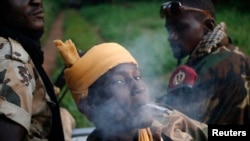Amnesty International has published the names of people suspected to have committed human rights violations and war crimes in the Central African Republic. The human rights group says these individuals must be investigated and held accountable in order for the country to begin a peace and reconciliation process.
The new report, entitled Central African Republic: Time for Accountability, turns a spotlight on high-profile members of the mostly Christian anti-balaka and mainly Muslim Seleka armed rebel groups, who are suspected of having committed serious crimes against humanity.
The C.A.R. has been plagued by religious and inter-communal violence since Seleka rebels overthrew the president in a March 2013 coup. It is estimated that thousands have been killed and more than a million people have been displaced.
Amnesty International has documented some of the abuses and crimes since then, which include rape, dismemberment, mutilation and large-scale civilian killings.
‘Living freely’
Amnesty International’s C.A.R. researcher, Christian Mukosa, says most of the suspected perpetrators have enjoyed impunity, despite the fact that many of their crimes are known to authorities.
“It is not acceptable that people who have been involved in serious human rights violations continue living freely in Bangui and in other places. Especially in Bangui, where they are living just under the nose of the transitional authorities and the international peacekeeping forces. This is unacceptable and something must be done to ensure that investigations can start in those instances,” says Mukosa.
Some of the suspects, such as former president Francois Bozize and former Seleka leader Michel Djotodia, have been sanctioned by the United Nations and the United States for “undermining the peace, stability and security of C.A.R.,” but continue to move about freely.
Others, such as anti-balaka commander Richard Bejouane and Colonel “12 Puissance,” have spoken publicly about the crimes against humanity that they have committed and their roles in inciting violence.
No justice, no peace
Mukosa said that there are a number of reasons why suspected perpetrators have gone unpunished.
“One of the reasons is that the judiciary is too weak in Central African Republic… The country has been in insecurity for a long, long time. There is also the issue of a lack of independent institutions in the judiciary, and also the fact that since the beginning of this new crisis most of the lawyers, judges [and] prosecutors are not around, because some are living in sites for displaced people, others have fled the country,” said Mukosa.
Mukosa said those who are still around say they are afraid to start investigations due to fear of retaliation.
Many of the courthouses and jails have been destroyed, making it difficult to even begin investigations.
“This is why in this report we are calling for the authorities to seek assistance from the international community to ensure that investigations can take place... No issues in terms of peace agreement, in terms of reconciliation, can move along if there is no justice for the victims, if impunity continues for serious human rights violations,” said Mukosa.
On May 30, C.A.R. interim President Catherine Samba-Panza formally requested the International Criminal Court open investigations in the country. The ICC has yet to accept or deny the request.
Amnesty International is recommending a hybrid court be set up, in which international experts will help C.A.R. nationals carry out investigations, while strengthening the local judicial system.




